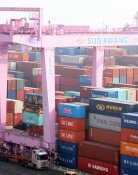U.S.: Lets Clarify the Timing of Providing Light-Water Reactor to the North
U.S.: Lets Clarify the Timing of Providing Light-Water Reactor to the North
Posted September. 22, 2005 07:44,
On September 20, the New York Times (NYT) reported the details regarding the phrase, The United States, China, Russia, Japan, and South Korea will discuss providing North Korea with a light-water reactor at the appropriate time, from the six-party talks joint statement. According to the NYT, expecting potential controversy over the phrase, U.S. Secretary of State Condoleezza Rice tried to get an assurance of a clear position from Korea, China, Japan and Russia.
The U.S. initially opposed any reference concerning providing the North a light-water reactor in the joint statement. NYT reported that, however, China included the controversial phrase, and Korea and Russia agreed with China.
On the afternoon of September 17 when the talks were in deadlock over the inclusion of a light-water reactor in the agreement, Secretary Rice suggested Korean Foreign Minister Ban Ki-moon and the Japanese counterpart Nobutaka Machimura, who were in New York for the U.N. General Meeting, to issue a supplementary statement announcing each countrys position, apart from the joint statement of the six-party talks. Rices intention, in short, was to make it clear that a light-water reactor would be provided to the North only after it rejoins the Nuclear Non-proliferation Treaty (NPT) and undergo inspections by the International Atomic Energy Agency (IAEA).
Korea and Japan agreed with Rices mediation proposal. NYT reported that although Korea agreed, it complained that a mediation proposal would destroy the atmosphere for a possible breakthrough. Russia and China announced statements making the sequence more ambiguous.
Faced with such an obscure situation over the weekend, China pressed the U.S. either to sign the agreement that it drafted or to take responsibility over the breakdown of the talks.
NYT quoted a senior official of the U.S. administration as saying, China said for quite a while that it would explain to reporters that the U.S. frustrated the agreement of the talks. Against such a backdrop, Chinese Foreign Minister Li Zhaoxing called Secretary Rice in an effort to persuade her on September 16 and at night on September 18.
The U.S. eventually noted that it could accept the agreement containing the ambiguous expression on the morning of September 19. NYT said that some delegations expressed surprise at the U.S. decision.
However, regarding the report of NYT, an official of Korean delegation stated, I dont remember our country reacting that way, as was reported by NYT, when it was asked about the announcement of additional statement by the U.S., and added, I find it hard to understand that part.
Soon-Taek Kwon maypole@donga.com







